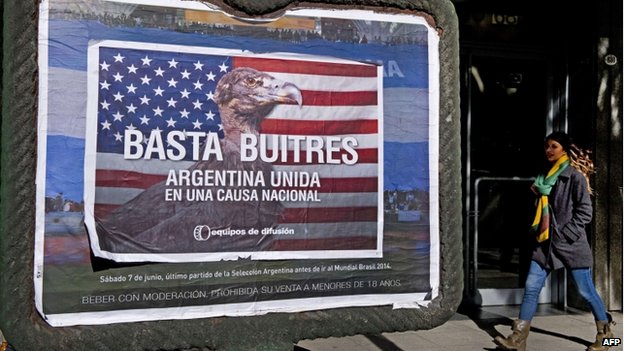UN Human Rights Council Backs Argentina on US Debt Row
UNITED NATIONS, 29 Sep 2014
BBC News – TRANSCEND Media Service

“Enough vultures – Argentina united around a national cause,” reads the poster displayed in Buenos Aires
26 Sep 2014 – The United Nations Human Rights Council has passed a resolution in Geneva condemning a group of American hedge funds that took Argentina to court.
The investors are demanding payments worth more than $1.3bn (£766m) dollars on government bonds they hold.
Argentina defaulted on its debts in July after refusing to comply with a US court ruling in favour of the funds.
It is searching for ways of meeting its obligations to its other creditors without paying the hedge funds in full.
The Argentine government has accused the hedge funds, which it refers to as vulture funds, of being greedy and damaging its economy.
“The vulture funds will not stop unless we stop them ourselves,” Foreign Minister Hector Timerman told the council before the vote.
“The billions that these vulture funds grab in countries in the south lead to school closures, hospitals without medicines, political instability, insecurity and violence,” he said.
The resolution was tabled by Argentina along with Russia, Brazil, Venezuela and Algeria.
It was approved by 33 votes to five, with nine countries abstaining.
The United States, Britain, Germany, Japan and the Czech Republic voted against.
‘Higher borrowing costs’
The resolution “condemns the activities of vulture funds” and says it regrets the effect the debt payment to such funds could have “on the capacity of governments to fulfil their human rights obligations”.
The American representative at the council, Keith Harper, said the text was unacceptable.
“The state’s responsibility for promoting and protecting human rights and fundamental freedoms is not contingent on its sovereign debt situation,” he said.
The uncertainty could “drive up borrowing costs or even choke off financing for developing countries,” added Mr Harper.
The investors – led by hedge funds NML and Aurelius Capital Management – bought Argentine government bonds at a big discount after Argentina’s 2001 default.
They rejected the terms of a restructuring agreed by most bondholders in 2005 and 2010 which saw two-thirds of the bonds’ pre-crisis value written off.
The hedge funds are instead demanding a full 100% repayment of the debt.
Argentina fell into default again in July after US District Judge Thomas Griesa barred the Bank of New York Mellon from transferring an interest payment to bondholders unless Argentina settled with the hedge funds.
Related Stories
- Argentina defies US court in debt row 11 September 2014
- Argentina in plan to avoid US ruling 20 August 2014
- Owners of Argentine debt plan appeal 15 August 2014
- Argentina defaults for second time 31 July 2014
DISCLAIMER: The statements, views and opinions expressed in pieces republished here are solely those of the authors and do not necessarily represent those of TMS. In accordance with title 17 U.S.C. section 107, this material is distributed without profit to those who have expressed a prior interest in receiving the included information for research and educational purposes. TMS has no affiliation whatsoever with the originator of this article nor is TMS endorsed or sponsored by the originator. “GO TO ORIGINAL” links are provided as a convenience to our readers and allow for verification of authenticity. However, as originating pages are often updated by their originating host sites, the versions posted may not match the versions our readers view when clicking the “GO TO ORIGINAL” links. This site contains copyrighted material the use of which has not always been specifically authorized by the copyright owner. We are making such material available in our efforts to advance understanding of environmental, political, human rights, economic, democracy, scientific, and social justice issues, etc. We believe this constitutes a ‘fair use’ of any such copyrighted material as provided for in section 107 of the US Copyright Law. In accordance with Title 17 U.S.C. Section 107, the material on this site is distributed without profit to those who have expressed a prior interest in receiving the included information for research and educational purposes. For more information go to: http://www.law.cornell.edu/uscode/17/107.shtml. If you wish to use copyrighted material from this site for purposes of your own that go beyond ‘fair use’, you must obtain permission from the copyright owner.